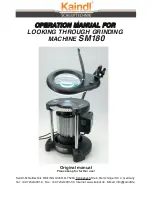
12 ENGLISH
Accidental re-start preventive function
When installing the battery cartridge while pulling the
switch lever, the tool does not start.
To start the tool, first release the switch lever. Then pull
the lock-off lever, and pull the switch lever.
Active Feedback sensing Technology
The tool electronically detects situations where the
wheel or accessory may be at risk to be bound. In the
situation, the tool is automatically shut off to prevent
further rotation of the spindle (it does not prevent
kickback).
To restart the tool, switch off the tool first, remove the
cause of sudden drop in the rotation speed, and then
turn the tool on.
Soft start feature
Soft start feature reduces starting reaction.
Electric brake
Electric brake is activated after the tool is switched off.
The brake does not work when the power supply is shut
down, such as the battery is removed accidentally, with
the switch still on.
ASSEMBLY
CAUTION:
Always be sure that the tool is
switched off and the battery cartridge is removed
before adjusting or checking function on the tool.
Installing side grip (handle)
CAUTION:
Always be sure that the side grip is
installed securely before operation.
Screw the side grip securely on the position of the tool
as shown in the figure.
►
Fig.6
Installing or removing wheel guard
WARNING:
When using a depressed center
wheel, flap disc or wire wheel brush, the wheel
guard must be fitted on the tool so that the
closed side of the guard always points toward the
operator.
WARNING:
Make sure that the wheel guard is
securely locked by the lock lever with one of the
holes on the wheel guard.
WARNING:
When using an abrasive cut-off
/ diamond wheel, be sure to use only the special
wheel guard designed for use with cut-off wheels.
(In some European countries, when using a diamond
wheel, the ordinary guard can be used. Follow the
regulations in your country.)
For depressed center wheel, flap
disc, wire wheel brush / abrasive cut-
off wheel, diamond wheel
1.
While pushing the lock lever, mount the wheel
guard with the protrusions on the wheel guard aligned
with the notches on the bearing box.
►
Fig.7:
1.
Lock lever
2.
Notch
3.
Protrusion
2.
While pushing the lock lever toward A, push in the wheel
guard by holding down the portions B as shown in the figure.
►
Fig.8:
1.
Wheel guard
2.
Hole
NOTE:
Push down the wheel guard straight.
Otherwise, you cannot push the wheel guard
completely.
3.
While keeping the lock lever and wheel guard
position as described in step 2, rotate the wheel guard
toward C, and then, change the angle of the wheel
guard according to the work.
►
Fig.9:
1.
Wheel guard
2.
Hole
NOTE:
Push the wheel guard completely. Otherwise,
you cannot rotate the wheel guard.
To remove wheel guard, follow the installation proce-
dure in reverse.
When using a depressed center
wheel or flap disc
Optional accessory
WARNING:
When using a depressed center
wheel or a flap disc, the wheel guard must be
fitted on the tool so that the closed side of the
guard always points toward the operator.
►
Fig.10:
1.
Depressed center wheel
2.
Wheel guard
When using an abrasive cut-off /
diamond wheel
Optional accessory
WARNING:
When using an abrasive cut-off
/ diamond wheel, be sure to use only the special
wheel guard designed for use with cut-off wheels.
(In some European countries, when using a diamond
wheel, the ordinary guard can be used. Follow the
regulations in your country.)
WARNING:
NEVER use cut-off wheel for side
grinding.
►
Fig.11:
1.
Abrasive cut-off wheel / diamond wheel
2.
Wheel guard for abrasive cut-off wheel /
diamond wheel
When using a wire cup brush
Optional accessory
CAUTION:
Do not use wire cup brush that is
damaged, or which is out of balance.
Use of dam-
aged brush could increase potential for injury from
contact with broken brush wires.
►
Fig.12:
1.
Wire cup brush
Summary of Contents for DGA520ZX1
Page 2: ...2 1 3 Fig 1 1 2 Fig 2 1 Fig 3 2 1 Fig 4 1 Fig 5 Fig 6 3 2 1 Fig 7 2 ...
Page 3: ...2 B 1 A B Fig 8 2 B 1 A B B C C Fig 9 1 2 Fig 10 1 2 Fig 11 1 Fig 12 1 2 Fig 13 3 ...
Page 4: ...B A 1 2 Fig 14 2 1 4 3 Fig 15 1 2 Fig 16 B A 1 Fig 17 15 Fig 18 Fig 19 Fig 20 4 ...
Page 5: ...Fig 21 Fig 22 2 1 Fig 23 1 Fig 24 2 6 7 4 5 2 3 1 Fig 25 5 ...
Page 115: ...115 ...













































